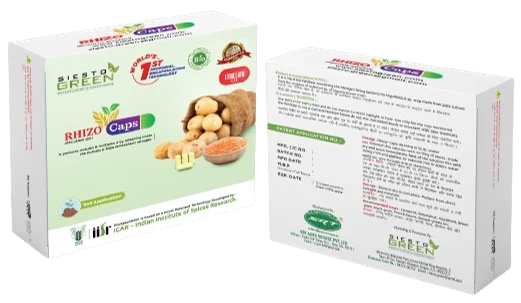RHIZO
RHIZOBIUM
Rhizobium bacteria meet the nitrogen needs of plants by forming root nodules on legume plants and promoting growth by fixing atmospheric nitrogen.
Rhizobium bacteria are soil-dwelling microorganisms that establish a symbiotic relationship with the roots of leguminous plants like peas, beans, and clover. This partnership allows Rhizobium to convert atmospheric nitrogen into a form that plants can utilize, through a process known as nitrogen fixation.

Per Acre Required = Minimum 2 capsules, Recommended 2 or 3 (Over Dose Has No Side Effects)
PACKAGING
packet contains 2 or 6 capsules.1 box contains 20 packets (40 or 120 capsules).1 carton contains 5 boxes (200 or 600 capsules).
APPLICATION TIMING
● During soil preparation.
● For seed treatment.
● Within 3 days of the Full Moon each month.
BENEFITS OF RHIZO
RECOMMENDATION
RECOMMENDED USAGE
Minimum 1 capsule per acre, with 2 to 3 capsules recommended for optimal results.
*Overdosing has no side effects.
SPECIFICATION OF RHIZO CAPSULE
Parameters
Biocapsule
(Powder Formulation)
BaseThe suitable base material in powder form along with the microorganism is encapsulated in Hard Gelatin capsule. Biocapsule is just a method of packaging of microbial agent in powder form.Carrier typeBase material filled in Biocapsule that favours growth of the microorganism.Total Viable count of all the bio-fertilizers organisms in the product
Higher microbial population CFU
1X1012 cells/capsule.
Particle size in case of carrier based moist powderPowders filled in hard gelatin I capsule will pass through 0.150- 0.212 mm IS Sieve. So, it complies with particle size parameter.Moisture per cent, by weight, maximum in case of carrier based1%ContaminationNo contamination will occur at 105 dilutionHazardous ingredientsNone according to controlled product regulations.PathogenicNon-pathogenic and beneficial microorganismpH6.5 – 7.5Temp. RangesTolerate: 100c – 500c (Optimum Temp. 280c – 300c)Biocapsule ColourPale yellowDimension/ Size00/23.6mmWeight0.9 – 1.0 gmOdourSpecific OdourMelting Point50 – 60 0 CStorageStored in cool/dry place. Protect from direct sunlight and moisture.DissolveEasily dissolved in luke warm water. For complete dissolving Biocapsule kept overnight in water.
Efficiency character:
(Rhizobium sp.)
The efficiency character of individual microorganisms to be determined as mentioned in case of individual biofertilizers through quantitative estimation methods as per FCO guidelines.
The encapsulation technology (Biocapsule) will not interfere with the efficiency character of the strains.
Note:
Do not mix chemical fertilizers with biofertilizers, which is likely to reduce the microbial population of biofertilizers.Biofertilizers are preferred over chemical fertilizers because they are not harmful.Biofertilizers are carrier based inoculants containing beneficial, efficient and effective microorganisms which help in enhancing the soil fertility.
